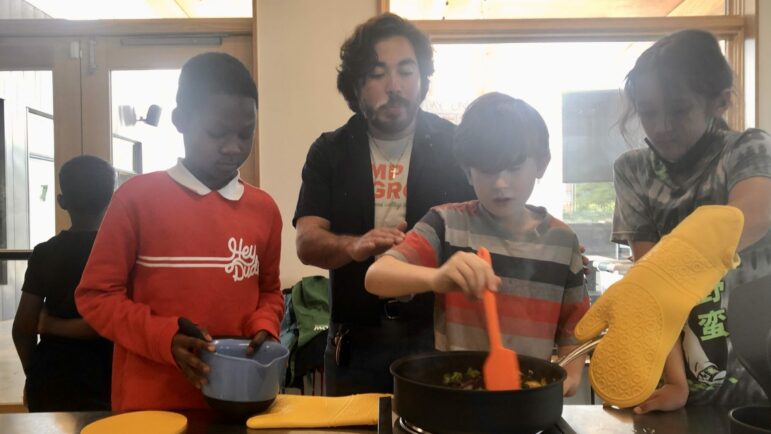[ad_1]
This tale is element of an occasional sequence termed Additional Credit history which shares the stories of non-common educators in Birmingham.
In Fernando Colunga’s class, cooking is normally the exercise of choice. When the 26-calendar year-previous teacher announces it’s time to go to the kitchen, all the young children in his class cheer and scramble to get in line at the classroom doorway.
In the newly renovated kitchen at Jones Valley Educating Farm, a nonprofit in Birmingham that teaches young children about food stuff and farming, learners chop kale and cabbage, saute broccoli and onions, and pour in a savory sauce for a vegetable stir-fry that’s been handmade and homegrown by 10-12 months-olds.
Colunga reported it’s in the course of things to do like this just one, when the young children get their arms soiled, when they find out the most.
“A good deal of the transform and a lot of the expansion does not automatically materialize when I’m in front of the class instructing about photosynthesis,” Colunga stated. “It happens when I’m up coming to them chopping, when we’re out on the area, harvesting, weeding.”
Recognised as “Farmer Fern” to his students, Colunga begun functioning at the educating farm five decades ago aftering volunteering for a couple of semesters in faculty. The time put in increasing meals and cooking in the kitchen turned into a whole-time passion for training about the significance of meals to young men and women.
“A whole lot of them think of food items as anything just needed, not automatically a thing exciting or a thing new,” he reported. “So when you get to open up the entire world of foodstuff, the world of increasing foodstuff, the earth of cooking your personal food stuff to students and viewing that spark in their eye is just remarkable.”

“Kids of color are the types who are impacted the most with food stuff inequality”
He explained it is his mission to introduce little ones to all types of fruits and vegetables—and not just because he likes cooking, but for the reason that he feels his get the job done is encouraging to address the root trigger of systemic problems in access to nutritious foodstuff, specifically in Birmingham
“Kids of shade are the kinds who are impacted the most with food stuff inequality,” Colunga stated. “So instructing pupils about foods and permitting them sort of recognize and see exactly where their food will come from will allow them to be empowered and acquire control of health selections down the road.”
He reported getting control above your system through the food items you try to eat is the to start with phase in combating systemic challenges in meals inequality. According to the United States Office of Agriculture about 70% of Birmingham inhabitants dwell in an place where it’s difficult to get reasonably priced and quality food. Group gardens like Jones Valley support address this problem, but Colunga explained it’s not just about how the meals is grown. It is also in which it will come from.
“Giving credit history where credit rating is due”
“I’ve been trying to be actually intentional about conversing about the origin of all of our foodstuff, the origin of our vegetables—where this meal culturally arrives from,” Colunga mentioned. “So supplying credit rating where by credit is thanks. So college students can see, ‘Wow, like this comes from all over the area. Let me be a lot more open up to all those cultures.’”
Colunga is aware about operating throughout cultures. He was born in Mexico and arrived to the U.S. as a tiny child. He stated he often introduces learners to food stuff from his lifestyle.
“All the young children have experienced veggie tamales, veggie empanadas, veggie tostadas like just about anything that you can feel about,” he claimed. “All the foods that I know is foodstuff that my mom has cooked for me. A ton of it is turning scraps into anything remarkable and attractive. So that is wherever my enthusiasm lies with the college students is wanting at domestic staples and looking at if we can completely transform this into a meal that they would enjoy.”

Colunga believes food items is tied to everything—community, family and lifestyle. That’s why it’s his selection 1 priority to help pupils make all those connections even if they really do not turn out to be experienced chefs or farmers. But he explained understanding about meals inspires curiosity and empowers students to feel outside of what is on their plates and give back again to their communities.
“We want the pupils who are coming to our camp or currently being element of our culinary golf equipment at the educational institutions to eventually just take on our roles, to at some point be the instructors that teach again to their community,” he said.
Kyra Miles is a Report for America corps member reporting on education for WBHM.
Do you know a non-classic educator in your community truly worth featuring as component of the sequence Additional Credit score? E-mail [email protected].
[ad_2]
Resource connection

